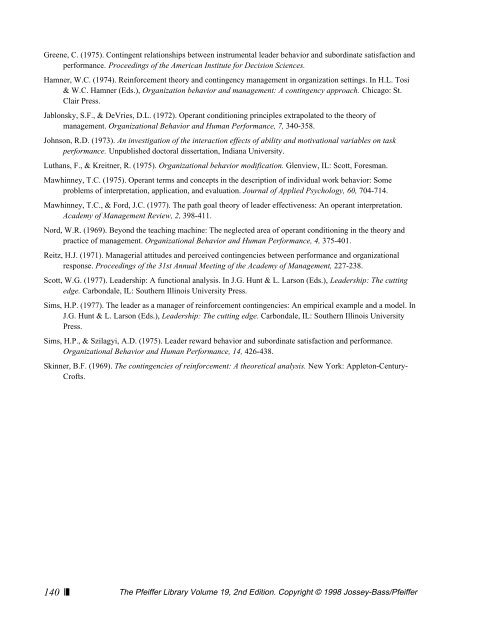motivational analysis of organizations
motivational analysis of organizations
motivational analysis of organizations
You also want an ePaper? Increase the reach of your titles
YUMPU automatically turns print PDFs into web optimized ePapers that Google loves.
Greene, C. (1975). Contingent relationships between instrumental leader behavior and subordinate satisfaction and<br />
performance. Proceedings <strong>of</strong> the American Institute for Decision Sciences.<br />
Hamner, W.C. (1974). Reinforcement theory and contingency management in organization settings. In H.L. Tosi<br />
& W.C. Hamner (Eds.), Organization behavior and management: A contingency approach. Chicago: St.<br />
Clair Press.<br />
Jablonsky, S.F., & DeVries, D.L. (1972). Operant conditioning principles extrapolated to the theory <strong>of</strong><br />
management. Organizational Behavior and Human Performance, 7, 340-358.<br />
Johnson, R.D. (1973). An investigation <strong>of</strong> the interaction effects <strong>of</strong> ability and <strong>motivational</strong> variables on task<br />
performance. Unpublished doctoral dissertation, Indiana University.<br />
Luthans, F., & Kreitner, R. (1975). Organizational behavior modification. Glenview, IL: Scott, Foresman.<br />
Mawhinney, T.C. (1975). Operant terms and concepts in the description <strong>of</strong> individual work behavior: Some<br />
problems <strong>of</strong> interpretation, application, and evaluation. Journal <strong>of</strong> Applied Psychology, 60, 704-714.<br />
Mawhinney, T.C., & Ford, J.C. (1977). The path goal theory <strong>of</strong> leader effectiveness: An operant interpretation.<br />
Academy <strong>of</strong> Management Review, 2, 398-411.<br />
Nord, W.R. (1969). Beyond the teaching machine: The neglected area <strong>of</strong> operant conditioning in the theory and<br />
practice <strong>of</strong> management. Organizational Behavior and Human Performance, 4, 375-401.<br />
Reitz, H.J. (1971). Managerial attitudes and perceived contingencies between performance and organizational<br />
response. Proceedings <strong>of</strong> the 31st Annual Meeting <strong>of</strong> the Academy <strong>of</strong> Management, 227-238.<br />
Scott, W.G. (1977). Leadership: A functional <strong>analysis</strong>. In J.G. Hunt & L. Larson (Eds.), Leadership: The cutting<br />
edge. Carbondale, IL: Southern Illinois University Press.<br />
Sims, H.P. (1977). The leader as a manager <strong>of</strong> reinforcement contingencies: An empirical example and a model. In<br />
J.G. Hunt & L. Larson (Eds.), Leadership: The cutting edge. Carbondale, IL: Southern Illinois University<br />
Press.<br />
Sims, H.P., & Szilagyi, A.D. (1975). Leader reward behavior and subordinate satisfaction and performance.<br />
Organizational Behavior and Human Performance, 14, 426-438.<br />
Skinner, B.F. (1969). The contingencies <strong>of</strong> reinforcement: A theoretical <strong>analysis</strong>. New York: Appleton-Century-<br />
Cr<strong>of</strong>ts.<br />
140 ❘❚<br />
The Pfeiffer Library Volume 19, 2nd Edition. Copyright © 1998 Jossey-Bass/Pfeiffer

















